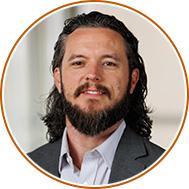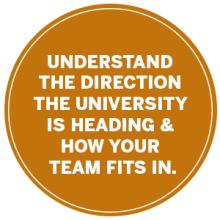Derek Trabon, Director, Office of Emergency Management

1. Describe your role for UT.
I oversee the Office of Emergency Management (OEM) for the University. This includes activities related to hazard mitigation, emergency preparedness, response and recovery from either planned or unplanned major incidents. Our team also oversees business continuity which focuses on business interruptions, upstream/downstream dependencies, and setting recovery objectives.
2. What was the most important lesson you learned as a new manager?
Leading by example. I’ve been fortunate to work for several great leaders, where I was a follower first and learned from the examples that they provided. I would not ask something of anyone on our team that I myself would not, or could not, do first. To me, being the “example” means setting expectations and standards for everyone on the team to see, starting with me.
3. What advice do you have for managers to help develop their team?

Understand the direction the University is heading and how your team fits in. Our team has certainly heard me quote Lewis Carroll before, but “if you don’t know where you are going, any road will get you there” helps to ground our conversations about setting goals and objectives to the overall mission of the University and for our OEM team. When we all see the bigger picture, we are all on the same page and better understand our role.
4. Why is learning in the workplace important?
Our emergency management and business continuity fields are respectively very dynamic, ever-changing landscapes. Our team interfaces often with other departments at UT, but equally as often with agencies outside of UT who are our community partners that support what we do. It’s imperative for us to learn about these agencies and the support they may provide us, and vice versa when our support is needed. When legislative or regulatory changes also occur, we have to understand any implications for UT.
5. What have you recently learned, what are you currently learning about, or how are you developing yourself as a professional?
Our field is relatively young and always rapidly growing. This requires us to have a constant working knowledge of other industries so that we understand their focus, concerns, and how and where we fit. The intersecting domains of technology, research, and healthcare alone have both limitless potential and concerns for us. For example, while we continue to study enhancements in technology and how we incorporate them, we still need to remember the lessons we’ve observed from COVID-19.
UT L&D Manager Spotlight
Contact
For questions about or requests for services, contact L&D through our brief intake form.